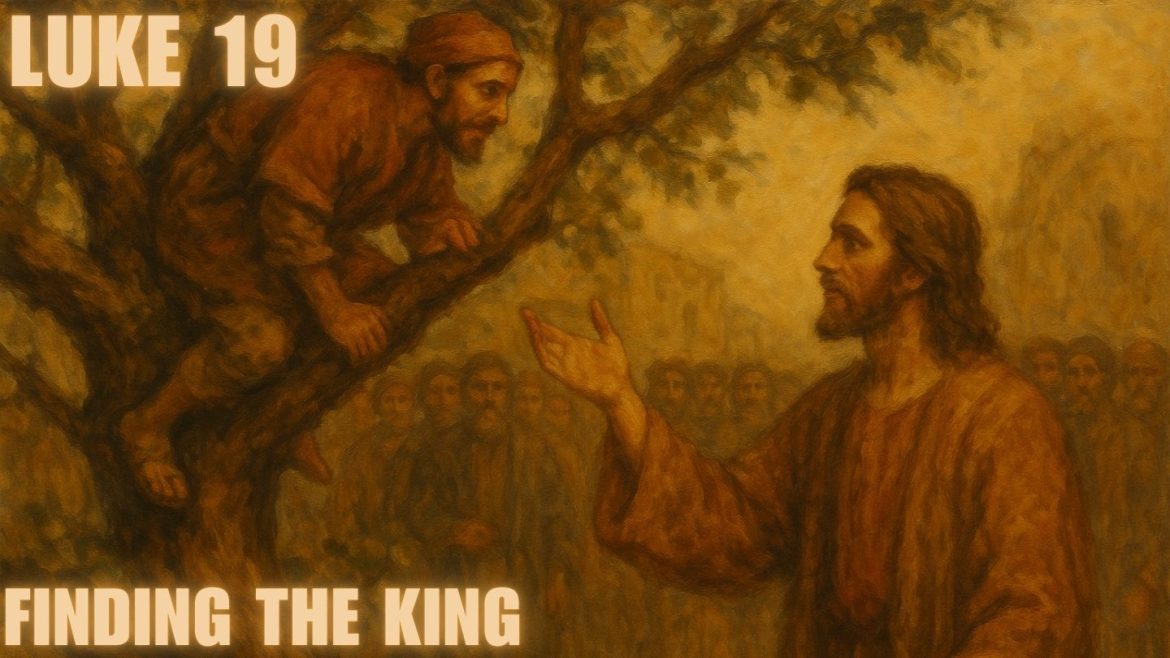Luke 19 isn’t just another chapter in the Bible—it’s a dramatic unfolding of how Jesus challenges societal norms, especially around wealth, status, and obedience. We meet a corrupt tax collector, a nobleman giving out coins, and a weeping Savior on a donkey. Through these stories, the chapter reveals God’s heart: that transformation, generosity, and spiritual insight matter far more than appearance or power. In today’s chaotic world, where greed and division dominate headlines, Luke 19 is a timely call to look inward and upward.
Zacchaeus: The Outcast Redeemed
We start in Jericho, a lush and significant city. Here lives Zacchaeus, a wealthy but reviled tax collector. His money came from corruption—extorting more than required. Despite his status, Zacchaeus is spiritually bankrupt. Yet, he’s eager to see Jesus and climbs a tree to get a glimpse.
Jesus does something radical: He calls Zacchaeus by name and invites Himself over. In a culture that looked down on sinners, this act of grace is scandalous. But it works. Zacchaeus responds by pledging half his wealth to the poor and repaying his fraud fourfold.
Key Lesson: Wealth isn’t inherently evil. The issue is what we do with it. Zacchaeus didn’t just repent with words—he put his money where his faith was. That’s transformation.
The Parable of the Ten Minas: Accountability in God’s Kingdom
Jesus then tells a parable about a nobleman who entrusts his servants with coins (minas) while he leaves to receive a kingdom. On his return, he evaluates how each servant used the money. One multiplies it tenfold, another fivefold, and one hides it out of fear. The nobleman rewards the first two but condemns the third for wasting his opportunity.
This parable echoes the idea of stewardship: everything we have—time, skills, money—is entrusted to us by God. Our job isn’t to hoard it or hide it, but to use it for the Kingdom.
Modern Analogy: Think of it like getting a small business grant. If you bury the money out of fear, you’ve wasted the opportunity. But if you use it, even imperfectly, you’ve honored the investor. God wants engagement, not perfection.
Jesus Enters Jerusalem: Humility and Heartbreak
As Jesus nears Jerusalem, He rides a humble donkey—fulfilling Zechariah’s prophecy of a peaceful king. The people cheer, hoping He’ll overthrow the Romans. But Jesus knows their expectations are misplaced. He weeps over the city, heartbroken that they missed the message of peace.
Instead of grasping the kingdom values of humility and repentance, they were looking for military conquest and power.
Reflection: How often do we miss God’s work in our lives because it doesn’t look like what we expected? Jesus’ tears remind us that spiritual blindness has real consequences—not just personal, but societal.
Applying Luke 19 to Today
Luke 19 is not an ancient relic. It speaks to the modern world in powerful ways:
- Generosity Over Greed: In a consumer-driven culture, Zacchaeus shows us the freedom and joy that come from releasing what we hold tightly.
- Purposeful Living: The parable of the minas challenges us to ask, “What am I doing with what I’ve been given?” Whether it’s your talent for teaching, your savings, or your compassion, it’s meant to be multiplied.
- Expect the Unexpected: Like the people who expected a war-hero Messiah, we can get caught up in our own assumptions. Faith requires flexibility—to follow Jesus, even when the path looks humble or counterintuitive.
- God Sees Us: Jesus knew Zacchaeus’s name. He sees each of us, no matter how hidden or unworthy we feel. That truth alone can reshape a life.
Conclusion: Invest in Eternal Things
Luke 19 is an invitation—to be like Zacchaeus, to use our minas well, and to recognize Jesus as the humble Savior we didn’t expect but desperately need. This chapter reminds us that repentance is powerful, that stewardship matters, and that Jesus still weeps over missed opportunities. But it also reminds us that transformation is possible, no matter how far we’ve strayed. Take what you’ve been given, and invest it into something eternal.

